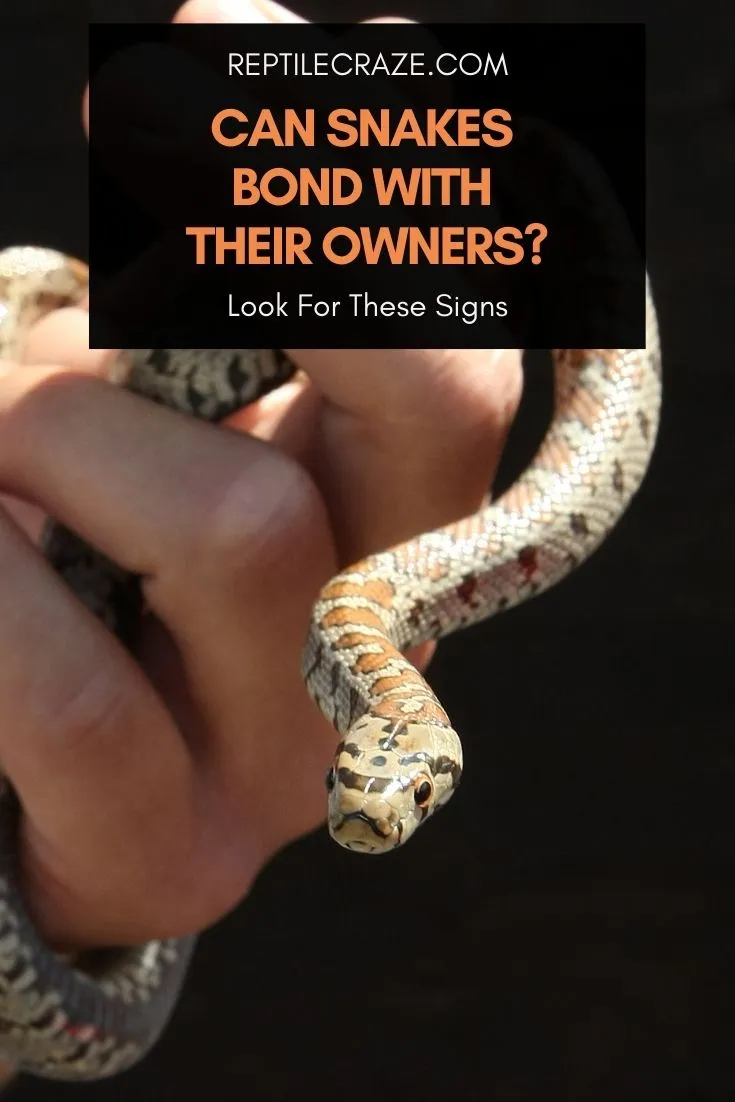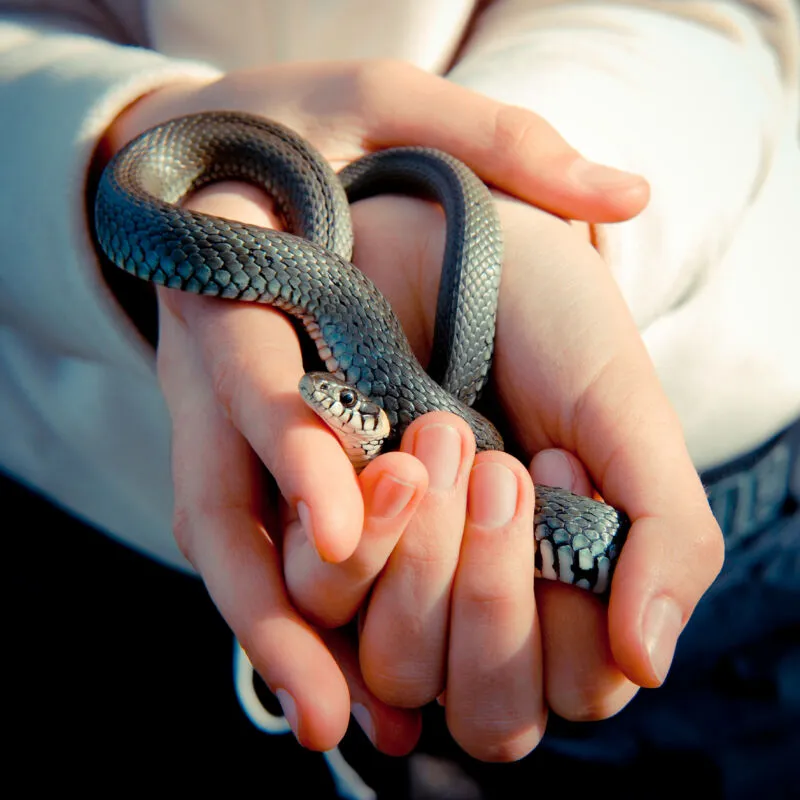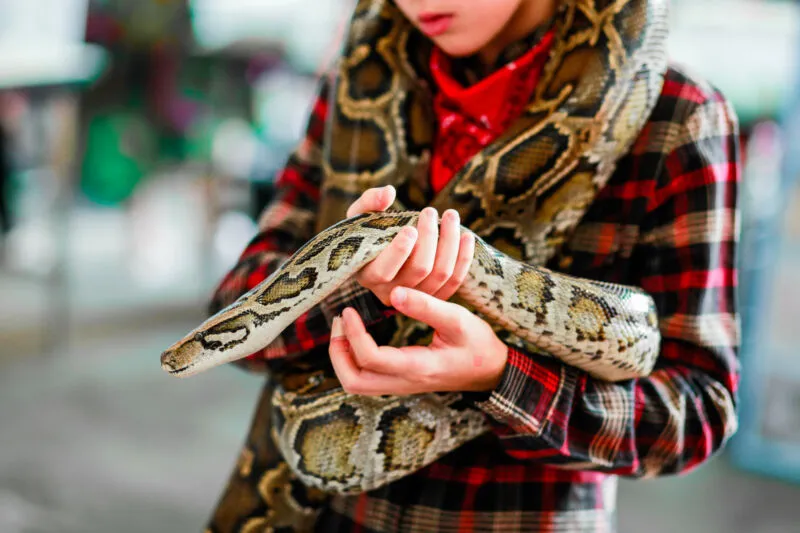
Snakes are fascinating pets for a number of reasons, from their unique behavior to their beautiful appearance. However, you may be questioning whether you can really bond with your snake. In fact, it likely is possible for you to form a bond with your pet snake, although this bond may not look the same as the relationships that you have with other pets.
While studies have shown that snakes can prefer certain snakes over others, it is still not sure that snakes can actually bond with humans and prefer some over others. However, most snakes can get used to the presence and touch of humans.
Here’s what you need to know about the way that snakes bond with people and some tips to help you develop a strong relationship with your snake.
Table of Contents
Are Snakes Capable of Bonding With Their Owners?
Snakes may not be as cuddly or openly affectionate as some other pets like cats, dogs, and even birds and rodents. However, that doesn’t mean that they aren’t capable of forming some kind of bond with their owner.
Studies have found that snakes can prefer some snakes over other snakes, which indicates that they are able to form a preference for the company they keep.
The relationship that snakes can form with other snakes can even be described as a friendship.
Does the fact that snakes can bond with other snakes mean that they can also bond with people? Snakes have an extremely good sense of smell, thanks to their unique vomeronasal organ which lets them “taste” smell.
It seems likely that they can use this powerful sense of smell to recognize individual people.
Since snakes can very likely tell people apart, it also seems probable that they may be able to show a preference between individuals.
What Does a Bond Between a Human and a Snake Look Like?
Snakes may not wag their tail, jump around, or crawl into your lap to show their affection.
So how can you know that there is a bond between a person and a snake? Here are a few indications that a snake may enjoy the company of a person:
Calm and relaxed in your presence
Snakes that are uncomfortable or frightened around a person will typically try to escape with fast, frenzied movements.
Therefore, if a snake is relaxed and easygoing in your presence, it is likely that they are bonding with you.
Your Snake eats while you’re around
Eating makes a snake vulnerable, so many snakes choose not to eat when they are around a person if they don’t trust that person.
A snake that takes food from you or eats while you’re in the room is more likely to feel warmly towards you.
Doesn’t mind being held
If your snake responds to being picked up by gently gripping your arms or body and calmly exploring your shoulders, head, etc. they are showing that they trust you.
Snakes that settle down on your shoulders or lap and seem to show no desire to get away are displaying a clear bond with you.
Your Snake seeks you out
If your snake comes to the front of the enclosure when you are around, comes to you when they are being allowed to explore house plants or other environments within the home, or otherwise seems to look for you, it is likely an indication that they enjoy your presence and have developed a bond.
Explores when you’re around
Snakes that are calmly exploring their environment with unhurried movements are comfortable that there is no predator eminently threatening them, so if your snake explores when you are present, it likely indicates that they do not view you as a threat.
Behaves differently with you
If your snake behaves in the above ways with you but not with other people, it is likely an indication that your snake has bonded with you and views you differently than they view other people.

Are Some Snakes More Likely to Bond With Humans Than Others?
Snakes that have been bred in captivity for longer periods may be more likely to bond with humans.
After all, these snakes may have a genetic predisposition to view humans as caretakers, since they have been cared for by humans for many generations.
People are more likely to breed snakes that are calm and relaxed in a captive environment, which means that snakes that have been bred in captivity for some time may have been selected to be more likely to bond with people.
Corn snakes, many pythons, and many boas are all good options if you want a snake that is likely to form a positive relationship with you.
Snakes that are captured from the wild are least likely to form bonds with people, since they likely have grown up viewing humans as potential predators.
Snakes may be less likely to learn new information as they get older, so choosing a snake that has been raised around people from a young age makes it much more likely that you will form a bond with that snake.
It’s also a good idea to get your pet snake as young as possible, since growing up with you from a young age may be more likely to cause them to develop a positive association and bond with you.
What Can You do to Form a Bond With Your Snake?
If you want the best possible relationship with your snake, you’ll surely be glad to learn that there are a few things that you can do to make a bond more likely:
Be confident.
Insecure or fearful movements may be perceived as predatory, which will make your snake less likely to trust you. Therefore, it’s very important that you approach your snake with confidence.
Associate yourself with good things.
Food is one of the best things in a snake’s life, so staying around while your snake eats is a good way to associate yourself with
Another thing most snakes enjoy is exploring, so taking your snake to house plants or other areas to let them explore can be a good way to build a bond between you.
Support your snake’s whole body.
Many people make the mistake of handling a snake with only one hand, dangling the snake in the air. This can cause a lot of insecurity for a snake, making them less likely to bond with you.

Never restrain your snake’s head.
If you are frightened that your snake might bite you, it can be tempting to hold them behind the head so that they won’t be able to. However, this is a very predatory action that breaks trust with your snake.
Time handling appropriately.
Snakes don’t like to be held before or after they eat, when they are shedding, or to be woken up from a nap. The best time to handle your snake is when they are exploring.
Enjoy a Great Bond With Your Snake
It is possible to have a good bond with your pet snake, even if that bond may not look like the relationship between other pets and their owners.
By choosing the right snake, recognizing the signs of a developing bond, and doing all that you can to develop a great relationship, you will likely enjoy a wonderful relationship with your snake.
- Enchi Ball Python: A Unique and Stunning Morph of Python regius - March 27, 2025
- Emerald Tree Monitor: The Enigmatic Green Guardian of the Rainforest - March 26, 2025
- The Egyptian Cobra (Naja haje): A Fascinating Serpent - March 25, 2025
